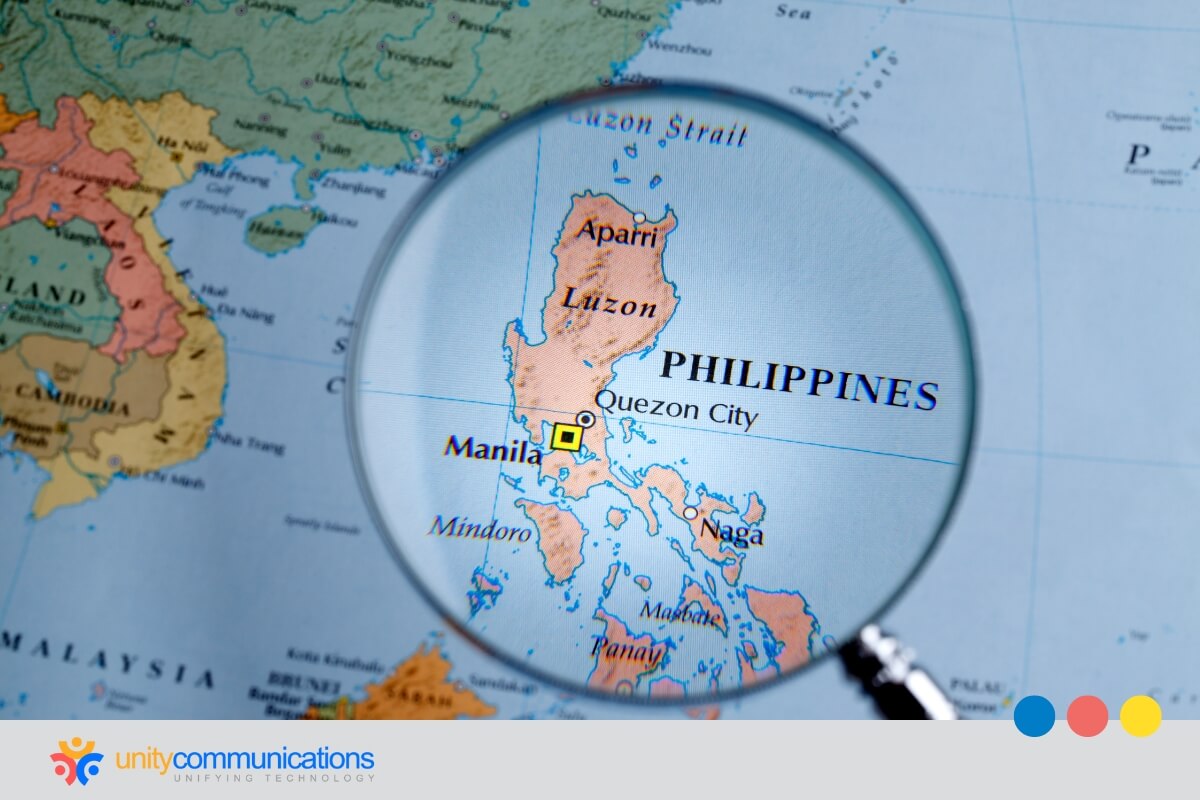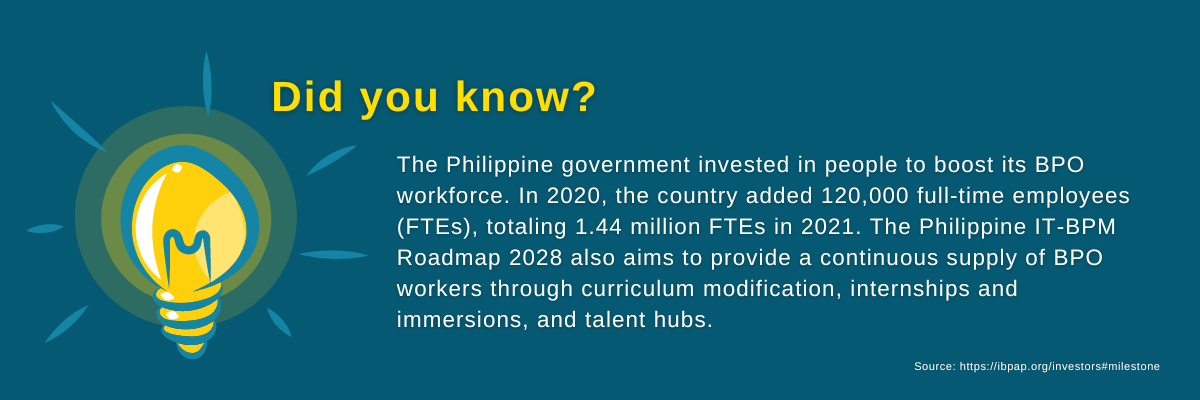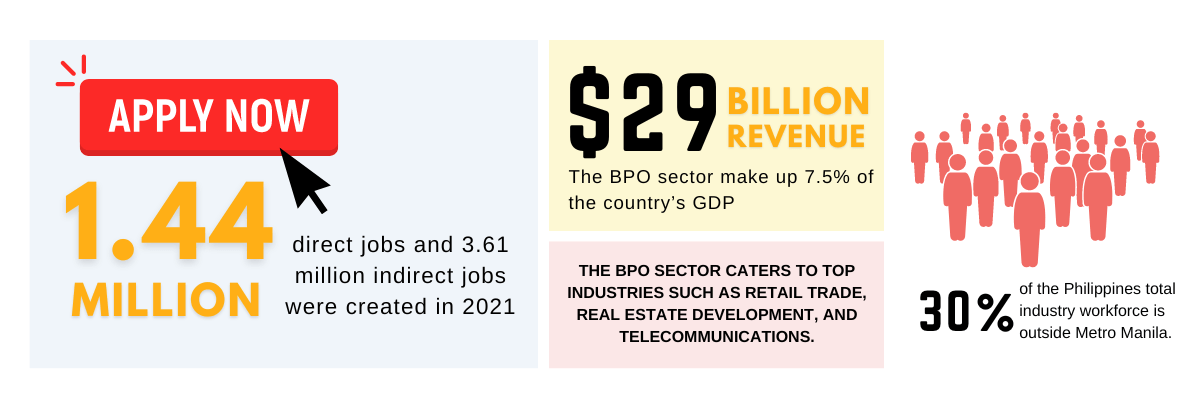Table of Contents
Did you know that the Philippines is known as the BPO capital of the world? That is according to Outsource Accelerator, the leading marketplace for outsourcing.
The nation is a major player in the BPO industry, popular for its cost-effective labor, full government support, and favorable business environment. It offers an attractive value proposition for businesses looking to outsource their operations. Therefore, working with an offshoring provider in the Philippines makes sense.
But do not take our word for it yet. Continue reading to learn why offshoring to the Philippines is a top choice for a successful outsourcing engagement.
Nine Real Reasons the Philippines Is a Leading BPO Destination

Business process outsourcing (BPO) has become a popular strategy for scaling operations. Specifically, offshore outsourcing—or simply offshoring—is the practice of outsourcing business functions to a distant country. It has become a viable option for reducing costs and improving performance.
Among the top destinations for offshoring is the Philippines. Over the past two decades, the nation has enhanced its BPO industry to become an outsourcing powerhouse. Today, it stands as the world’s call center and BPO capital.
According to Colliers, the Philippines could capture a bigger global BPO market share. Its information technology and business process management (IT-BPM) segment alone comprises nearly 15% of the worldwide share, with experts forecasting it to have hit $29 billion last year.
We can attribute the success of the nation’s BPO industry to various factors. Here are a few reasons offshoring to the Philippines has become a top BPO choice:
1. Cost-effective Labor
The Philippines has become a top offshoring hub because it offers significant cost savings. To give you a clearer idea of the difference, the average hourly rates of BPO vendors in the Philippines and the United States are $12 to $14 and $24 to $28, respectively. Despite the lower labor costs, businesses can expect high-quality services from Philippine BPO providers.
In addition, the cost-reduction benefit of offshoring to the Philippines goes beyond labor expenses. Companies can save on infrastructure costs, utility bills, and other operating expenses by employing front- or back-office outsourcing.
2. Diverse Pool of Skilled Talent
The Philippines is home to a diverse pool of highly skilled talent. The country has many university graduates in various fields, from accounting and finance to IT and communication. So whether businesses outsource tech solutions or customer-facing services, they can access talented professionals in the country.
The Philippine government invested in people to boost its BPO workforce. In 2020, the country added 120,000 full-time employees (FTEs), totaling 1.44 million FTEs in 2021. The Philippine IT-BPM Roadmap 2028 also aims to provide a continuous supply of BPO workers through curriculum modification, internships and immersions, and talent hubs.
3. English-proficient Workforce
Due to globalization, English-language proficiency has become a vital factor in business interactions. That said, high English fluency is one of the key advantages of Philippine BPO providers. The language is widely understood and spoken in the country since it is the primary medium of instruction in education.
The Philippines ranked 22nd globally in the English Proficiency Index (EPI) 2022 edition. The nation also placed second in East and Southeast Asia. This language competency is crucial for businesses with customer-facing services such as contact centers and customer service operations. It helps reduce communication barriers when offshoring to the Philippines.
4. Hardworking People With Good Work Ethics
When outsourcing, companies hire BPO vendors to leverage world-class facilities and the latest technologies, such as contact center as a service (CCaaS) software. However, nothing beats employing a dedicated workforce that can be instrumental to business growth and success. That is where the Philippines has a competitive advantage.
Why? Filipino workers are known for their work ethics and commitment. They are among the most diligent and resilient workers in the world. They value their jobs to make ends meet and provide food for their families. They are also notable for their hospitality, empathy, and patience, which are ideal for customer service and other front-office functions.

5. Strong Cultural Affinity With Westerners
The Philippines has a strong cultural affinity with Western nations, particularly the U.S. This is partly due to its history as a former American colony, not to mention its constant exposure to American culture through media and education. Such compatibility makes it easy for Filipino contractors to adapt to their Western clients’ cultural nuances and business practices.
Additionally, the Philippines has continued business partnerships with the United States. For instance, the United States Agency for International Development (USAID) launched Strengthening Private Enterprise for the Digital Economy (SPEED), a five-year project aimed at advancing the digital ecosystem in the Philippines to bolster its economy.
6. Full Government Support
The BPO sector accounts for over 10% of the Philippine gross domestic product (GDP) and contributes nearly $30 billion annually to the economy. Thus, the Philippine government staunchly supports the BPO industry, recognizing it as a pivotal contributor to the national economy.
The government’s support started with enacting the Special Economic Zone Act and later establishing the Philippine Economic Zone Authority (PEZA). This law aims to attract local and foreign investors by creating favorable policies and tax incentives. Companies offshoring to the Philippines can capitalize on the government’s support.
7. Favorable Laws for Foreign Investments
The Philippine government enacted laws and regulations favorable to foreign investments, making it easier for companies to operate in the country. So whether offshoring customer service or data entry services, these companies can take advantage of the nation’s tax perks and other benefits.
The Philippine laws and regulations that support foreign investments are as follows:
- The Special Economic Zone Act offers tax incentives to businesses established in special economic zones (SEZ).
- The Foreign Investments Act allows 100% foreign ownership of companies in the country’s BPO industry.
- The Omnibus Investments Code encourages foreign investments by providing incentives.
8. Growing and Expanding BPO Market
The BPO industry is a dynamic and thriving market, with new opportunities and trends emerging year after year. As such, businesses offshoring to the Philippines can capitalize on its market growth and expansion. Take it from the Business Process Association of the Philippines (IBPAP). Here are some of the milestones of the country’s IT-BPM industry:
- Biggest job generator. The BPO industry created 1.44 million direct jobs and 3.61 million indirect jobs in 2021.
- Significant contributor to the economy. The BPO sector generated $29.5 billion in revenue, comprising 7.5% of the country’s GDP.
- Provincial expansion. The BPO industry expanded its reach to the provinces because 30% of the Philippine total industry workforce is outside Metro Manila.
- Segment expansion. The BPO sector caters to top industries such as retail trade, real estate development, and telecommunications.
The nation’s BPO industry shows no sign of stopping or slowing down. So whether employing customer service or technical support outsourcing, companies can take advantage of these growth opportunities.

9. Ideal Business Environment
Offshoring to the Philippines has become a top choice for companies seeking BPO solutions due to the country’s ideal business environment. The nation’s economic policies and business regulations have consistently welcomed foreign investors. Companies see the Philippines as a leading outsourcing hub, thanks to the government’s support and the industry’s continued growth.
In recent years, the Philippines has consistently appeared on the Tholons list of top digital nations. The country secured the 15th spot in the 2023 Tholons Global Business Innovation Sustainability Index (TBIS). Categorized as a “Big Kahuna” nation and described as one of the “new leaders having built a vibrant foundation,” it scored high in three business aspects:
- Super Cities
- Business and Diversity
- Equity and Inclusion (DEI)
The Bottom Line
Offshoring to the Philippines is a wise strategy, with the country being a key player in the BPO industry.
As explained, the country’s affordable labor costs and highly skilled workforce make it a top destination for offshoring. Its full government support, favorable laws, and industry growth have created an ideal business environment.
As the global BPO industry grows, the Philippines remains a top outsourcing destination. The nation will continue to significantly contribute to the growth and success of businesses worldwide.
Ready to scale your business with cost-effective outsourcing? Discover why the Philippines is the top choice for offshoring. Contact us today to explore your options!



